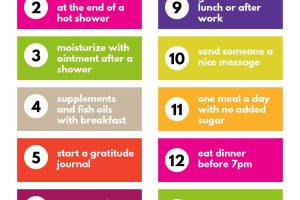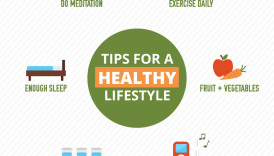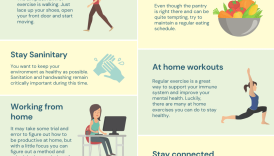Wellness 101: Tips for a Healthier Mind and Body

Importance of Wellness
Wellness is an essential aspect of life that encompasses physical, mental, emotional, and social well-being. It plays a pivotal role in how we feel, interact with others, and go about our daily activities. As individuals strive for healthier lifestyles, the importance of wellness becomes even more apparent. Imagine waking up each morning with increased energy to face the day’s challenges, ready to engage with the world. This level of vigor doesn’t happen by chance; it results from intentional choices around wellness. Prioritizing well-being can lead to:
- Wellness 101: Tips for a Healthier Mind and Body
- Importance of Wellness
- Achieving Balance
- Physical Wellness
- Healthy Eating Habits
- Regular Exercise Routine
- Mental Wellness
- Stress Management Techniques
- Practicing Mindfulness
- Sleep Health
- Importance of Quality Sleep
- Tips for Better Sleep
- Emotional Well-being
- Building Resilience
- Cultivating Positive Relationships
- Self-Care Practices
- Setting Boundaries
- Incorporating Relaxation Techniques
- Holistic Approaches
- Alternative Therapies
- Mind-Body Connection
- Social Wellness
- Community Engagement
- Communication Skills
- Environmental Wellness
- Creating a Healthy Living Space
- Connecting with Nature
- Professional Wellness
- Work-Life Balance
- Career Development Strategies
- Improved mood and emotional stability
- Enhanced relationships and social connections
- Better physical health and sustained energy levels
Achieving Balance
Achieving balance in life is a continuous journey, not a destination. It often means finding the right mix of work, leisure, and self-care. For example, incorporating a weekly yoga class can provide physical benefits while also grounding the mind, effectively blending physical and mental wellness into one activity. To maintain a balanced lifestyle, consider:
- Setting realistic goals
- Practicing time management
- Allocating time for relaxation and recreation
By focusing on these areas, individuals can cultivate a more balanced, fulfilling life that promotes overall wellness.
Physical Wellness
Healthy Eating Habits
Healthy eating is the cornerstone of physical wellness. It fuels the body with essential nutrients and plays a significant role in maintaining energy levels throughout the day. Adopting healthy eating habits doesn’t mean giving up all the foods you love; rather, it’s about balance and moderation. For instance, swapping out sugary snacks for fresh fruit can provide a satisfying treat while boosting your vitamin intake. Consider these simple strategies for healthier eating:
- Plan your meals: Take a few minutes each week to outline what you’ll eat to avoid impulse decisions.
- Incorporate whole foods: Focus on fruits, vegetables, whole grains, and lean proteins.
- Stay hydrated: Aim for at least 8 glasses of water daily to keep your body functioning optimally.
Regular Exercise Routine
Alongside healthy eating, regular exercise is crucial for improving physical wellness. The benefits of consistent physical activity are profound, from enhancing mood to increasing stamina. Developing a regular workout routine can be as simple as:
- Setting achievable goals: Start with 30 minutes of moderate exercise, five days a week.
- Mixing it up: Combine cardio, strength training, and flexibility exercises for a well-rounded approach.
- Having fun: Choose activities you enjoy—whether it’s dancing, biking, or hiking—which makes it easier to stick with your routine.
Incorporating these elements ensures that you not only look after your body but also foster a sustainable, enjoyable lifestyle that promotes overall physical wellness.
Mental Wellness
Stress Management Techniques
Moving beyond physical wellness, mental wellness is equally essential for leading a fulfilled life. Stress management is a vital component of maintaining mental health. Everyday life can throw countless stressors our way, making it crucial to have effective techniques in place. Personally, I’ve found that incorporating simple practices into my routine can work wonders. Some effective stress management techniques include:
- Deep breathing exercises: Taking a few minutes to breathe deeply can help calm the mind and reduce tension.
- Time management: Prioritizing tasks can alleviate feelings of overwhelm.
- Regular breaks: Short breaks during work or study can significantly enhance focus and productivity.
Practicing Mindfulness
Mindfulness is another powerful tool for enhancing mental wellness. It encourages living in the moment and can reduce anxiety and improve emotional regulation. Integrating mindfulness into daily life can be as easy as:
- Meditation: Just five to ten minutes of meditation can help ground your thoughts and promote feelings of tranquility.
- Mindful walking: Focus on each step and the sensation of your feet on the ground to cultivate awareness.
- Journaling: Writing down thoughts and feelings can help clarify the mind and reduce stress.
By employing these stress management techniques and practicing mindfulness regularly, individuals can create a stable foundation for strong mental wellness.
Sleep Health
Importance of Quality Sleep
Transitioning from mental wellness, it’s essential to address sleep health. Quality sleep is fundamentally linked to both physical and mental well-being. It’s during sleep that the body repairs itself, consolidates memories, and detoxifies the brain. A few sleepless nights can leave anyone feeling foggy and irritable, impacting overall performance and emotional health. For instance, when I prioritize sleep, I notice a significant difference in my productivity and mood. Studies show that adults need between 7 to 9 hours of sleep nightly for optimal health.
Tips for Better Sleep
Improving sleep quality is often achievable with some simple lifestyle adjustments. Here are practical tips to consider:
- Create a bedtime routine: Engage in calming activities like reading or taking a warm bath before sleep.
- Limit screen time: Avoid blue light from screens at least an hour before bed to help the body transition into sleep mode.
- Maintain a sleep-friendly environment: Keep the bedroom cool, dark, and quiet to promote restful sleep.
By focusing on quality sleep through these strategies, individuals can enhance their overall wellness and improve both physical and mental health in the process.
Emotional Well-being
Building Resilience
As we shift from sleep health to emotional well-being, building resilience becomes a key component of maintaining a positive mindset. Resilience is the ability to bounce back from challenges and setbacks and is vital for navigating life’s ups and downs. Personally, I’ve learned that developing resilience often involves embracing adversity rather than avoiding it. Here are a few strategies to enhance resilience:
- Practice self-awareness: Recognize your emotions and reactions to stressors.
- Set realistic goals: Focus on achievable objectives, breaking larger tasks into smaller steps.
- Maintain a growth mindset: View challenges as opportunities for growth.
Cultivating Positive Relationships
Another crucial aspect of emotional well-being is nurturing positive relationships. Surrounding ourselves with supportive, understanding individuals can greatly enhance our emotional health. To cultivate these connections, consider:
- Investing time in relationships: Regularly check in with friends and family, showing genuine interest in their lives.
- Practicing gratitude: Express appreciation for the people who uplift you.
- Joining community groups: Engaging in activities and clubs can help expand your social circle.
By focusing on resilience and fostering positive relationships, individuals can create a robust emotional foundation that supports overall well-being.
Self-Care Practices
Setting Boundaries
Transitioning from emotional well-being, self-care practices are essential for maintaining balance in life. One important aspect of self-care is setting boundaries. It can be challenging, especially for those who find it hard to say no. However, establishing clear boundaries is crucial for protecting your time and energy. I learned this the hard way when overcommitting to social events led to burnout. To set effective boundaries, consider these tips:
- Assess your limits: Regularly evaluate what you can and cannot take on.
- Communicate openly: Be honest with others about your availability and needs.
- Practice saying no: Start with low-stakes situations to build your assertiveness.
Incorporating Relaxation Techniques
In addition to boundaries, incorporating relaxation techniques into your daily routine can significantly enhance self-care. Finding moments to unwind helps recharge mental and physical energy. Here are a few techniques to integrate:
- Progressive muscle relaxation: Focus on tensing and then relaxing different muscle groups to ease tension.
- Aromatherapy: Using essential oils, such as lavender or chamomile, can create a calming environment.
- Gentle yoga or stretching: Just 10 minutes of gentle stretching can promote relaxation and flexibility.
By prioritizing the establishment of boundaries and integrating relaxation techniques, individuals can nurture their well-being and foster a healthier lifestyle.
Holistic Approaches
Alternative Therapies
Transitioning from self-care practices, holistic approaches offer a comprehensive way to enhance overall wellness. Embracing alternative therapies can complement traditional healthcare methods, providing additional avenues for healing and relaxation. Personally, I’ve found therapies like acupuncture and aromatherapy to be surprisingly effective in managing stress and promoting relaxation. Some popular alternative therapies include:
- Acupuncture: Utilizing thin needles, this ancient Chinese practice aims to balance energy within the body.
- Massage therapy: Regular massages can relieve muscle tension and boost circulation.
- Herbal medicine: Incorporating herbal supplements can support various aspects of health, from sleep to immunity.
Mind-Body Connection
Another essential element of holistic health is understanding the mind-body connection. Our mental and emotional states can significantly impact physical health. For instance, practices that promote mental clarity, such as meditation and yoga, can reduce symptoms of anxiety and enhance resilience. To strengthen the mind-body connection, consider:
- Meditation: Just a few minutes of focused breathing can help center your thoughts and reduce stress.
- Mindful movement: Activities like yoga and tai chi encourage awareness of the body, promoting balance and flexibility.
By exploring alternative therapies and nurturing the mind-body connection, individuals can embrace a holistic approach to their overall health and well-being.
Social Wellness
Community Engagement
As we move from holistic approaches to social wellness, the importance of community engagement becomes clear. Building and maintaining connections with others plays a vital role in fostering a sense of belonging and support. Personally, I’ve experienced firsthand how participating in community events has enriched my life and provided a network of friendships and resources. To enhance community engagement, consider:
- Volunteering: Offer your time to local organizations, whether at a food bank or an animal shelter. It’s a rewarding way to give back.
- Joining clubs or groups: Find local clubs that match your interests, such as book clubs or sports teams, to meet like-minded individuals.
- Attending local events: Participate in community festivals, workshops, or classes to connect with your neighborhood.
Communication Skills
Alongside community engagement, honing communication skills is essential for social wellness. Effective communication fosters meaningful relationships and enhances our ability to connect with others. To improve your communication skills, try:
- Active listening: Focus on what others are saying without interrupting or planning your response.
- Clarity and confidence: Express your thoughts clearly and assertively to avoid misunderstandings.
- Non-verbal cues: Be mindful of your body language and facial expressions, as they can greatly influence how your message is received.
By prioritizing community engagement and enhancing communication skills, individuals can cultivate robust social connections that contribute to their overall wellness and happiness.
Environmental Wellness
Creating a Healthy Living Space
Transitioning from social wellness, environmental wellness is increasingly recognized as a crucial aspect of overall health. The spaces we inhabit can significantly impact our well-being. A healthy living space promotes comfort, reduces stress, and enhances productivity. Personally, I have noticed how decluttering and organizing my space immediately lifts my mood and helps me focus better. To create a healthy living environment, consider these tips:
- Declutter regularly: Get rid of items you no longer need—this can create a sense of calm.
- Incorporate plants: Adding greenery not only beautifies your space but also purifies the air.
- Choose non-toxic materials: Opt for eco-friendly paints and cleaning products to ensure a healthier home.
Connecting with Nature
In addition to cultivating a healthy living space, connecting with nature is vital for environmental wellness. Spending time outdoors has been proven to boost mood, creativity, and overall mental health. Here are some ways to enhance that connection:
- Regular walks in nature: Aim to spend time walking or hiking in parks or nature reserves to recharge your spirit.
- Gardening: Whether it’s flowers or vegetables, gardening fosters a connection to the earth and can be incredibly rewarding.
- Mindfulness outdoors: Practice mindfulness activities like yoga or meditation outside to deepen your connection with the natural world.
By focusing on creating a healthy living space and fostering a connection with nature, individuals can significantly enhance their environmental wellness, which plays an essential role in overall well-being.
Professional Wellness
Work-Life Balance
As we transition from environmental wellness, it’s crucial to explore professional wellness, which is fundamental to sustaining a fulfilling career and personal life. Achieving a healthy work-life balance is essential for overall well-being. I personally experienced the positive impacts of balance when I started setting clear boundaries between work and my personal time, leading to increased productivity and reduced stress. To cultivate work-life balance, consider these practices:
- Set clear boundaries: Define your work hours and stick to them to avoid burnout.
- Prioritize tasks: Use to-do lists or digital tools to focus on what genuinely needs attention.
- Schedule downtime: Make sure to allocate time for relaxation and hobbies that recharge you.
Career Development Strategies
In addition to balance, implementing career development strategies can enhance your professional wellness. Continuous learning and growth not only improve job satisfaction but also contribute to a sense of purpose. Explore these strategies for career advancement:
- Seek mentorship: Building connections with experienced professionals can provide valuable guidance and insight.
- Set goals: Establish short and long-term career goals to give direction and motivation.
- Professional training: Attend workshops, webinars, or courses to enhance your skills and knowledge.
By focusing on achieving work-life balance and pursuing meaningful career development strategies, individuals can foster professional wellness, ultimately leading to a more satisfying work experience and a healthier lifestyle.




